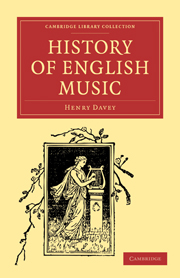Book contents
- Frontmatter
- PREFACE
- Contents
- CHAPTER I BEFORE THE INVENTION OF COMPOSITION
- CHAPTER II THE INVENTION OF POLYPHONY (1400–53)
- CHAPTER III THE PERIOD OF THE INVENTION OF INSTRUMENTAL COMPOSITION (1453–1536)
- CHAPTER IV THE REFORMATION: FROM THE DISSOLUTION OF THE MONASTERIES TO THE DEFEAT OF THE ARMADA (1536–88)
- CHAPTER V THE MADRIGALIAN PERIOD (1588–1630)
- CHAPTER VI THE AGE OF THE DECLAMATORY SONGS, OF THE FANCIES FOR VIOLS, AND OF THE SUPPRESSION OF ECCLESIASTICAL MUSIC (1630–1660)
- CHAPTER VII THE PERIOD OF FOREIGN INFLUENCE, AND OF DRAMATIC MUSIC (1660–1700)
- CHAPTER VIII THE PERIOD OF PATRIOTIC SONGS (1701–1800)
- CHAPTER IX THE NINETEENTH CENTURY
- APPENDIX
- INDEX
CHAPTER V - THE MADRIGALIAN PERIOD (1588–1630)
Published online by Cambridge University Press: 29 August 2010
- Frontmatter
- PREFACE
- Contents
- CHAPTER I BEFORE THE INVENTION OF COMPOSITION
- CHAPTER II THE INVENTION OF POLYPHONY (1400–53)
- CHAPTER III THE PERIOD OF THE INVENTION OF INSTRUMENTAL COMPOSITION (1453–1536)
- CHAPTER IV THE REFORMATION: FROM THE DISSOLUTION OF THE MONASTERIES TO THE DEFEAT OF THE ARMADA (1536–88)
- CHAPTER V THE MADRIGALIAN PERIOD (1588–1630)
- CHAPTER VI THE AGE OF THE DECLAMATORY SONGS, OF THE FANCIES FOR VIOLS, AND OF THE SUPPRESSION OF ECCLESIASTICAL MUSIC (1630–1660)
- CHAPTER VII THE PERIOD OF FOREIGN INFLUENCE, AND OF DRAMATIC MUSIC (1660–1700)
- CHAPTER VIII THE PERIOD OF PATRIOTIC SONGS (1701–1800)
- CHAPTER IX THE NINETEENTH CENTURY
- APPENDIX
- INDEX
Summary
THE destruction of the Spanish Armada left England in fullest splendour of power and glory. The very next year Spenser completed and published the first section of his great poem. Then followed the earliest attempt of Bacon to direct the mind of man away from barren words into the path of useful studies. And now a half-educated scapegrace came from a little Midland town, and in a few years showed himself the greatest genius who has ever walked the earth; a dramatist whose works are of all England's glories the most permanent.
But in this wonderful time English music was not quite on a level with English poetry, English heroism, or English philosophy. It was not the first in the world. Palestrina had, about the beginning of Elizabeth's reign, made Italian music superior to all other; and- though the English instrumental music was still unrivalled, it had not the immortal beauty of the best polyphonic vocal music. This period, however, produced, on the whole, the greatest results; English music and English poetry were both at their climax. The English instrumental music now began to exercise a marked influence upon the Continent, where it was speedily imitated, and afterwards surpassed. The connection between the earliest German instrumental music and its English models has only recently been traced.
Byrd stood without rival or second among English musicians at the opening of this period. It was probably through the troubles his recusancy brought him that he sold his monopoly to Thomas East (Este, Est), a printer living in Aldersgate Street.
- Type
- Chapter
- Information
- History of English Music , pp. 168 - 245Publisher: Cambridge University PressPrint publication year: 2009First published in: 1895



